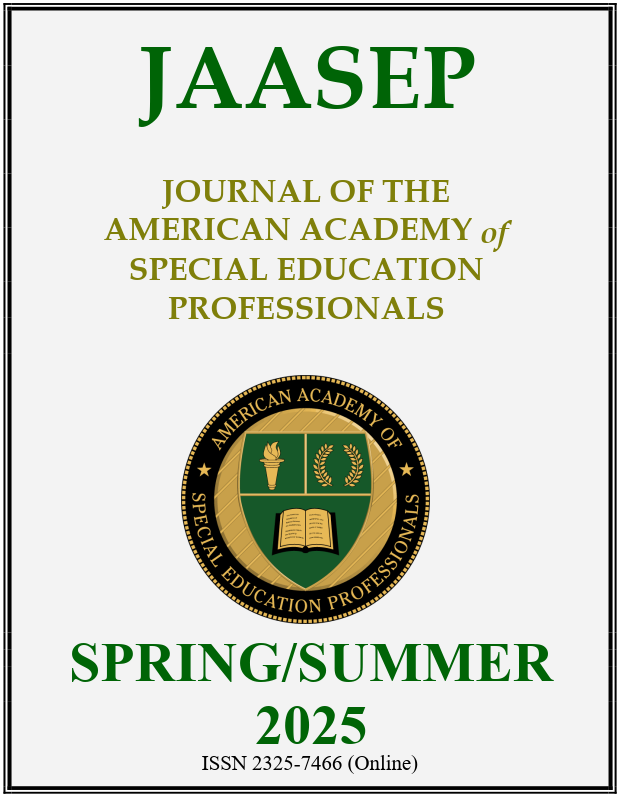Modeling Co-Teaching for Collaborative Proficiency
Allday, R. A., Neilsen-Gatti, S., & Hudson, T. M. (2013). Preparation for inclusion in teacher education pre-service curricula. Teacher Education and Special Education, 36(4), 298-311. https://doi.org/10.1177/0888406413497485 DOI: https://doi.org/10.1177/0888406413497485
Arndt, K., & Liles, J. (2010). Preservice teachers' perceptions of coteaching: A qualitative study. Action in Teacher Education, 32(1), 15-25. https://doi.org/10.1080/01626620.2010.10463539 DOI: https://doi.org/10.1080/01626620.2010.10463539
Bacharach, N., Heck, T. W., & Dahlberg, K. (2007). Co-teaching in higher education. Journal of College Teaching & Learning (TLC), 4(10), 19-26. https://doi.org/10.1177/0731948720919811 DOI: https://doi.org/10.19030/tlc.v4i10.1532
Blanton, L. P., Boveda, M., Munoz, L. R., & Pugach, M. C. (2017). The affordances and constraints of special education initial teacher licensure policy for teacher preparation. Teacher Education and Special Education, 40(1), 77-91. https://doi.org/10.1177/0888406416665449 DOI: https://doi.org/10.1177/0888406416665449
CAST. (2018). Universal design for learning guidelines version 2.2. Available from http://udlguidelines.cast.org
Charmaz, K. (2006). Constructing grounded theory: A practical guide through qualitative analysis. Sage.
Creswell, J. W. (2002). Educational research: Planning, conducting, and evaluating quantitative and qualitative research. (Vol. 7). Prentice Hall.
Friend, M., Cook, L., Hurley-Chamberlain, D., & Shamberger, C. (2010). Co-teaching: An illustration of the complexity of collaboration in special education. Journal of Educational and Psychological Consultation, 20(1), 9-27. https://doi.org/10.1080/10474410903535380 DOI: https://doi.org/10.1080/10474410903535380
Gehrke, R. S., & Cocchiarella, M. (2013). Preservice special and general educators’ knowledge of inclusion. Teacher Education and Special Education, 36(3), 204-216. https://doi.org/10.1177/0888406413495421 DOI: https://doi.org/10.1177/0888406413495421
Glaser, B. G., & Strauss, A. L. (1967). Discovery of grounded theory: Strategies for qualitative research. Aldine. DOI: https://doi.org/10.1097/00006199-196807000-00014
Harvey, M. W., Yssel, N., Bauserman, A. D., & Merbler, J. B. (2010). Preservice teacher preparation for inclusion: An exploration of higher education teacher-training institutions. Remedial and Special Education, 31(1), 24-33. https://doi.org/10.1177/0741932508324397 DOI: https://doi.org/10.1177/0741932508324397
Johnson, T. M., King-Sears, M. E., & Miller, A. D. (2022). High school co-teaching partners’ self-efficacy, personal compatibility, and active involvement in instruction. Learning Disability Quarterly, 45(2), 96-107. https://doi.org/10.1177/0731948720919811 DOI: https://doi.org/10.1177/0731948720919811
Lautenbach, F., & Heyder, A. (2019). Changing attitudes to inclusion in preservice teacher education: A systematic review. Educational Research, 61(2), 231-253. https://doi.org/10.1080/00131881.2019.1596035 DOI: https://doi.org/10.1080/00131881.2019.1596035
Lee, J., Bryant, D. P., Ok, M. W., & Shin, M. (2020). A systematic review of interventions for algebraic concepts and skills of secondary students with learning disabilities. Learning Disabilities Research & Practice, 35(2), 89-99. https://doi.org/10.1111/ldrp.12217 DOI: https://doi.org/10.1111/ldrp.12217
Mandinach, E., Friedman, J. M., & Gummer, E. (2015). How can schools of education help to build educators’ capacity to use data? A systemic view of the issue. Teachers College Record, 117(4), 1-50. DOI: https://doi.org/10.1177/016146811511700404
Ricci, L. A., & Fingon, J. (2018). Experiences and perceptions of university students and general and special educator teacher preparation faculty engaged in collaboration and co-teaching practices. Networks: An Online Journal for Teacher Research, 20(2). https://dx.doi.org/10.4148/2470-6353.1260 DOI: https://doi.org/10.4148/2470-6353.1260
Satsangi, R., Hammer, R., & Hogan, C. D. (2018). Studying virtual manipulatives paired with explicit instruction to teach algebraic equations to students with learning disabilities. Learning Disability Quarterly, 41(4), 227-242. https://doi.org/10.1177/0731948718769248 DOI: https://doi.org/10.1177/0731948718769248
Solis, M., Vaughn, S., Swanson, E., & McCulley, L. (2012). Collaborative models of instruction: The empirical foundations of inclusion and co‐teaching. Psychology in the Schools, 49(5), 498-510. https://doi.org/10.1002/pits.21606 DOI: https://doi.org/10.1002/pits.21606
Strogilos, V., King-Sears, M. E., Tragoulia, E., Voulagka, A., & Stefanidis, A. (2022). A meta-synthesis of co-teaching students with and without disabilities. Educational Research Review, 38, 100504. https://doi.org/10.1016/j.edurev.2022.100504 DOI: https://doi.org/10.1016/j.edurev.2022.100504
Yopp, R. H., Ellis, M. W., Bonsangue, M. V., Duarte, T., & Meza, S. (2014). Piloting a co-teaching model for mathematics teacher preparation: Learning to teach together. Issues in Teacher Education, 23(1), 91-111.
Downloads
Article Information
- Article Type Articles
- Submitted May 21, 2025
- Published June 15, 2025
- Issue Spring/Summer 2025
- Section Articles
